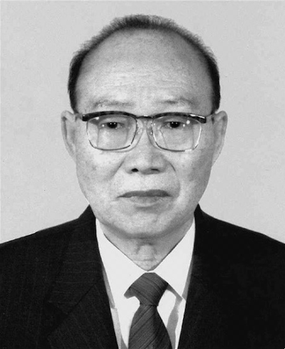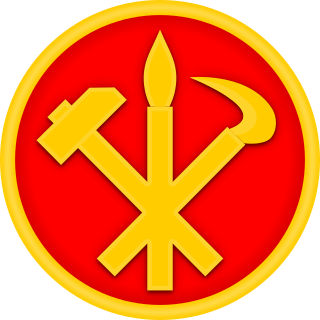Related Research Articles

Juche, officially the Juche idea, is the state ideology of North Korea and the official ideology of the Workers' Party of Korea. North Korean sources attribute its conceptualization to Kim Il Sung, the country's founder and first leader. Juche was originally regarded as a variant of Marxism–Leninism until Kim Jong Il, Kim Il Sung's son and successor, declared it a distinct ideology in the 1970s. Kim Jong Il further developed Juche in the 1980s and 1990s by making ideological breaks from Marxism–Leninism and increasing the importance of his father's ideas.

In the North Korean government, the Cabinet is the administrative and executive body. The North Korean government consists of three branches: administrative, legislative, and judicial. However, they are not independent of each other, but all branches are under the exclusive political leadership of the Workers' Party of Korea (WPK).

The Socialist Patriotic Youth League is a North Korean youth organization. It is the main youth organization in North Korea. Directly under the party Central Committee, it is the only mass organization expressly mentioned in the charter of the Workers' Party of Korea. Youth under 15 may join the Young Pioneer Corps, itself a part of the larger Korean Children's Union. The organization, modeled after the Komsomol in the former Soviet Union, includes all North Koreans without party membership between the ages of 15 and 30, although married women who opt to become housewives are transferred to the Socialist Women's Union. Officially, the guiding ideology of the organization is Kimilsungism–Kimjongilism.
The Communist movement in Korea emerged as a political movement in the early 20th century. Although the movement had a minor role in pre-war politics, the division between the communist North Korea and the anti-communist South Korea came to dominate Korean political life in the post-World War II era. North Korea, officially the Democratic People's Republic of Korea, continues to be a Jucheist state under the rule of the Workers' Party of Korea. In South Korea, the National Security Law has been used to criminalize advocacy of communism and groups suspected of alignment with North Korea. Due to the end of economic aid from the Soviet Union after its dissolution in 1991, due to the impractical ideological application of Stalinist policies in North Korea over years of economic slowdown in the 1980s and receding during the 1990s, North Korea continues to nominally uphold Communism, but has replaced Marxism-Leninism with the Juche idea. References to Communism were removed in the North Korean 1992 and 1998 constitutional revisions to make way for the personality cult of Kim's family dictatorship and the North Korean market economy reform. The Workers' Party of Korea under the leadership of Kim Jong Un later reconfirmed commitment to the establishment of a communist society, but orthodox Marxism has since been largely tabled in favor of "Socialism in our style". Officially, the DPRK still retains a command economy with complete state control of industry and agriculture. North Korea maintains collectivized farms and state-funded education and healthcare.

The Workers' Party of Korea (WPK) is the sole ruling party of the Democratic People's Republic of Korea, commonly known as North Korea. Founded in 1949 from the merger of the Workers' Party of North Korea and the Workers' Party of South Korea, the WPK is the oldest active party in Korea. It also controls the Korean People's Army, North Korea's armed forces. The WPK is the largest party represented in the Supreme People's Assembly and coexists with two other legal parties making up the Democratic Front for the Reunification of Korea. However, these minor parties are completely subservient to the WPK and must accept the WPK's "leading role" as a condition of their existence. The WPK is banned in the Republic of Korea under the National Security Act and is sanctioned by the United Nations, the European Union, Australia, and the United States.

The Central Committee of the Workers' Party of Korea is the highest organ between national meetings of the Workers' Party of Korea (WPK), the ruling party of North Korea. According to WPK rules, the Central Committee is elected by the party congress and the party conference can be conferred the right to renew its membership composition. In practice, the Central Committee has the ability to dismiss and appoint new members without consulting with the wider party at its own plenary sessions.
Kim Jong-gak is a Korean People's Army (KPA) official. He was a member of the Politburo of the Workers' Party of Korea (WPK). He served as Minister of Defence briefly in 2012, and Director of the General Political Bureau of the KPA in 2018.
Choe Thae-bok was a North Korean politician. He was a member of the Politburo and the Secretariat of the Workers' Party of Korea, and was chairman (speaker) of the Supreme People's Assembly for nearly 21 years, from 1998 to 2019. He was considered an advisor to Kim Jong-il, as well as a popular member of the core leadership. He spoke fluent English, German and Russian in addition to Korean.

In North Korea, the Political Bureau of the Central Committee of the Workers' Party of Korea (WPK), or simply the Politburo, formerly the Political Committee (1946–61), is the highest decision-making body in the ruling party between sessions of its Central Committee. Article 25 of the Party Charter stipulates that "The Political Bureau of the Party Central Committee and its Standing Committee organize and direct all party work on behalf of the party Central Committee between plenary meetings. The Political Bureau of the Party Central Committee shall meet at least once every month." The Politburo is elected by the Central Committee of the Workers' Party of Korea.

The Secretariat of the Workers' Party of Korea, formerly known as the Executive Policy Bureau (2016–21), manages the work of the Politburo of the Workers' Party of Korea and its Presidium. The General Secretary leads the work of the Secretariat, and the body is composed of several members.

Kim Kuk-thae was an elder apparatchik of the Workers' Party of Korea, the ruling party in North Korea.
The history of the Workers' Party of Korea (WPK) encompasses the period from 1949 onwards.

Kim Yang-gon was a North Korean politician and a senior official of the ruling Workers' Party of Korea.

The 7th Congress of the Workers' Party of Korea (WPK), the ruling party of North Korea, was held on 6–9 May 2016.

The Propaganda and Agitation Department, officially translated as the Publicity and Information Department, is a department of the Central Committee of the Workers' Party of Korea (WPK) tasked with coordinating the creation and dissemination of propaganda in North Korea. It is the highest propaganda organization in the country.
Kim Nung-o is a North Korean politician. He is the chairman of the Workers' Party of Korea (WPK) Party Committee of Pyongyang. Kim is also a full member of the Central Committee of the WPK and an alternate member of its Politburo.

Pak Kyong-suk was a North Korean politician. She was a seamstress in Kim Il Sung's guerrilla forces during the 1930s. After the liberation of Korea, she held posts in the Workers' Party of Korea (WPK), Democratic Women's League, as well as being a delegate to the Supreme People's Assembly.

The 8th Congress of the Workers' Party of Korea was held at the April 25 House of Culture in Pyongyang from 5 to 12 January 2021. A total of 7,000 people participated in the congress including 5,000 delegates. The Party Congress took place in the midst of the COVID-19 pandemic where no cases were reported.
The 6th Secretariat of the Workers' Party of Korea (WPK)(6차 조선로동당 비서국), officially the Secretariat of the 6th Central Committee of the Workers' Party of Korea, was elected by the 1st Plenary Session of the 6th Central Committee in the immediate aftermath of the 6th WPK Congress.

Officially, the Workers' Party of Korea (WPK) – the ruling party of North Korea – is a communist party guided by Kimilsungism–Kimjongilism, a synthesis of the ideas of Kim Il Sung and Kim Jong Il. The party is committed to Juche, an ideology attributed to Kim Il Sung which promotes national independence and development through the efforts of the popular masses. Although Juche was originally presented as the Korean interpretation of Marxism–Leninism, the party now presents it as a freestanding philosophy. The WPK recognizes the ruling Kim family as the ultimate source of its political thought. The fourth party conference, held in 2012, amended the party rules to state that Kimilsungism–Kimjongilism was "the only guiding idea of the party". Under Kim Jong Il, who governed as chairman of the National Defence Commission, communism was steadily removed from party and state documents in favour of Songun, or military-first politics. The military, rather than the working class, was established as the base of political power. However, his successor Kim Jong Un reversed this position in 2021, replacing Songun with "people-first politics" as the party's political method and reasserting the party's commitment to communism.
References
- ↑ 통일부 북한자료센터 주요 인물 정보 (in Korean). Ministry of Unification Information Center on North Korea . Retrieved 2014-03-24.
- ↑ "Kwak Pom-gi". Korean Broadcasting System website. Retrieved 14 March 2013.
- ↑ Central Intelligence Agency, 2010, The World Factbook, Potomac Books, pp. 342, ISBN 9781597975414
- ↑ Gause, Ken (2012). "The Role and Influence of the Party Apparatus". In Pak, Kyŏng-ae; Snyder, Scott (eds.). North Korea in Transition: Politics, Economy, and Society. Rowman & Littlefield. p. 42. ISBN 9781442218123.
- ↑ Taylor & Francis Group (2004). Europa World Year Book 2. Vol. 2. Taylor & Francis. p. 2463.
- ↑ "South Side's Group Feted". Korean Central News Agency. October 7, 2003. Retrieved 26 December 2013.
- 1 2 3 "North Korea permits first Russian Orthodox church". Deutsche Presse-Agenteur. August 8, 2006. Retrieved 26 December 2013.
- ↑ "Usher in a great heyday of Songun Korea full of confidence in victory". The Pyongyang Times . 6 January 2007. p. 1.
- ↑ "Vantage Point". Naewoe Press. 2007. Retrieved 13 March 2012.
- ↑ "Flames of Hamnam, Banner of Victory for 2012: Rodong Sinmun". Korean Central News Agency. 24 January 2012. Archived from the original on 12 October 2014. Retrieved 25 July 2013.
- ↑ "A New Party Economic Department?". North Korea Leadership Watch. 17 July 2013. Retrieved 25 July 2013.